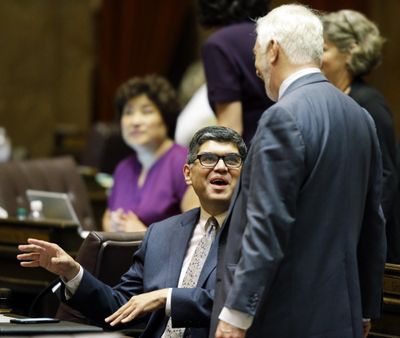Paid family and medical leave fast tracked through Legislature

OLYMPIA – Late Friday night, with great emotion but relatively little fanfare, the Legislature moved Washington into the forefront among states that provide financial help to parents after childbirth or when a family member is seriously ill or dying.
In strong bipartisan votes, the House and Senate moved quickly to approve a state-regulated program for paid family and medical leave. It’s a concept that supporters said had been discussed by lawmakers for some 15 years and cleared its last legislative hurdle through a compromise reached through bipartisan negotiations in recent weeks.
Gov. Jay Inslee called it “an amazing achievement,” one that would give Washington the best paid family leave program in the United States.
“It shows what you can do when you work together,” he said.
The benefit will provide 90 percent of a person’s average weekly wage, up to a maximum of $1,000 a week and a minimum of $100.
Both fathers and mothers will qualify for paid leave after the birth or adoption of a child.
Introduced just a day earlier, most lawmakers hadn’t read the full bill, but both supporters and opponents said it marked an important milestone.
It’s a historic opportunity for workers in Washington to “put their families first,” Rep. June Robinson, R-Everett, said when introducing it.
She and other supporters talked passionately – and sometimes tearfully – of the benefits of allowing a worker to spend time with a new baby or a dying parent.
It’s historic alright, Rep. Liz Pike, R-Camas, agreed, but not in a good way. “It’s one step toward a socialist state government.”
Pike and other critics warned of the dangers of adding one more government mandate on top of the state’s rising minimum wage and other government mandates. Sen. Mike Padden, R-Spokane Valley, said it would be particularly onerous on Spokane-area businesses, which already have costs and regulations that their competitors across the border in Idaho don’t have.
“It’s a job killer,” Padden said. “It’s done with the best of intentions, but I’m really afraid of the results.”
Had it passed on any other day, it might have immediately gathered front-page headlines. But it was sandwiched between votes on the 2017-19 operating budget and the tax packages that went along with that spending plan, which were needed to avert a partial government shutdown a few hours away.
The family and medical leave insurance programs authorized by the bill will be private, but overseen by the state Employment Security Department. They will take several years to set up, with premiums for insurance plans starting in 2019 and benefits available in 2020.
Businesses with fewer than 50 employees can opt out, which is “about as libertarian as you can get,” said Rep. Matt Manweller, R-Ellensburg, who helped negotiate the bill.
For small businesses that do participate, employees pick up the cost of the premiums, which could be as low as 80 cents a week. The number of weeks an employee can receive paid leave is capped at 12 weeks at any one time and 16 weeks in any year. Workers must give 30-day notice in many instances, and small business don’t have to hold a job open.
Some businesses also would be eligible for a $3,000 training credit from the state for up to 10 employees.
Unlike the minimum wage law, cities or counties won’t be able to require a more generous program.
“It’s not overly burdensome to the little guy,” Manweller said, adding that the possibility of a future Legislature expanding the program is “a legitimate concern.”
Progressive groups have talked of taking a paid family leave program to the voters through initiative in 2018 if the Legislature didn’t act this year. But the legislation split the state’s business organizations, with the Association of Washington Business, which represents a wide range of companies including the state’s biggest, offering its support and the National Federation of Independent Business, which represents small business, opposing it.
Senate Commerce and Labor Committee Chairman Mike Baumgartner, R-Spokane, held a hearing on the bill the day before the vote, shortly after it was introduced. He said he sympathized with the ideals behind the bill.
“Every child and every parent deserves to be able to spend those critical hours and days with their families if they can,” he said. But part of the push behind the bill is what he called “fear, cowardice and opportunism” from the threat of a worse program being put on the ballot next year.
Rather than rush it through as the state was trying to avoid a government shutdown, the Legislature should come back in January and spend more time on it, he said.
In the end, however, lawmakers decided they had waited long enough and many Republicans joined Democrats in both chambers to approve a bill that Inslee is expected to sign in the coming weeks.